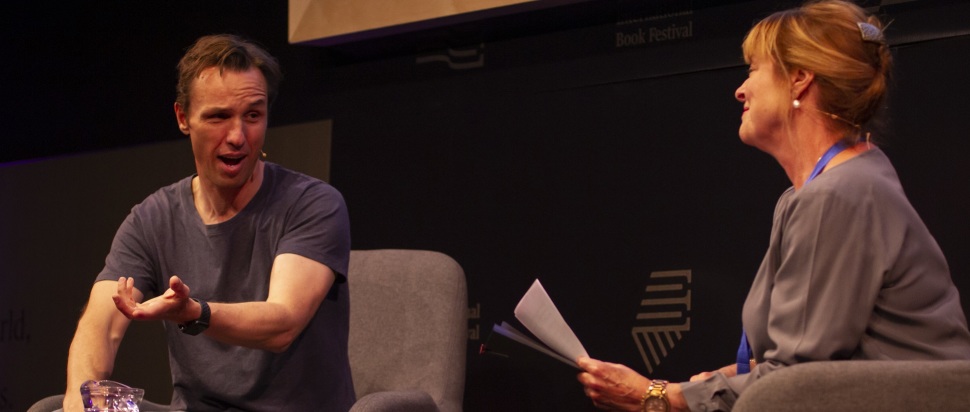Edinburgh Book Festival: A Feast of Fiction
With an international line-up in Edinburgh for the city's book festival, The Skinny popped by to catch some fine fiction authors appearing at Charlotte Square Gardens
Karen Campbell & Marcus Malte – Twists of History
This year’s festival programme proudly states 2019 is their most international yet. The event with Karen Campbell and Marcus Malte certainly fits this bill. Campbell – whose latest book The Sound of the Hours is based in Italy during WWII – joined French author Marcus Malte, speaking about his novel The Boy, translated by the excellent Vineet Lal.
The conversation balanced Campbell’s themes of identity and family with Malte’s main theme of nature versus nurture. Campbell spoke about the intensity of war and how things become a binary choice. “There comes a point where you have to pick a side,” she says, noting she was keen to be “true to the story” and to look at all angles.
Malte’s novel, set just before WWI, focuses on a feral child learning what it is to be human. When asked if they will be returning to the historical novel, both authors said no: they have written their next novelz already, contemporary. Campbell noted: “It was like a wee refreshing sorbet after a massive Italian feast.”
Campbell and Malte easily inspired the audience and left them with a taster of both an Italian and a French literary feast. [Rebecca Smith]
Chigozie Obioma & Namwali Serpell – Novel Views of Africa
Chigozie Obioma and Namwali Serpell’s event, chaired by the unparalleled Zoë Wicomb, was a spellbinding discussion of nation, narrative and the importance of story. Serpell’s reading from her debut novel The Old Drift, which is longlisted for the Booker Prize 2019, was a masterful example of storytelling; the clarity of her writing and blend of fiction and non-fiction kept the audience enraptured. Obioma, whose new novel An Orchestra of Minorities is also Booker-longlisted, spoke of the huge influence Chinua Achebe’s An Image of Africa: Racism in Conrad’s Heart of Darkness had on his second novel.
The discussion between the two authors, insightfully guided by Wicomb, danced through discussion of the two writers’ influences (they share a love for Achebe and his subversive Africanisation of the Western canon) and a delight in the simple art of the story – although both novels take this simplicity and insist on rebelling against its confines. Serpell summarised beautifully her reason for writing, agreed upon by Obioma: there is sheer delight and satisfaction in the purity of ‘what happens next’, and this is the heart of her passion for novels. [Beth Cochrane]
Markus Zusak – Boys Will Be Boys
The Book Thief was a literary phenomenon, but it began as a distraction from another idea 20 years ago. That was the story of the Dunbar brothers, and after a decade or so of diversion and life, that became Bridge of Clay.
The family dynamic was important for him to explore, and the idea evolved as his own children were born. He now writes mostly in the kitchen, surrounded by the surprises and chaos of their lives. Through the five brothers and their parents, he wanted to explore the family line. “We start becoming who we are long before we’re even born,” he muses. “There’s always a story before the story.”
“I can’t get the smile off my face and I can’t shut up,” he laughs, noting how his answers sprawl many topics. He just loves writing, and it’s this infectious attitude that soars across his event. He might have struggled with the book for over a decade, but he remembers the little bits of joy in finding the right word, in the stories that inspired his characters. He just loves fiction and it shows. “It’s a magic act. You know it’s made up, but while I’m in it – I believe it.” [Heather McDaid]
Jeanette Winterson – Modern Monsters and Mad Genius
Bounding on to stage, beloved novelist and critical darling Jeanette Winterson is here to deliver very much her version of a lecture. Pacing the stage, Winterson introduces her latest novel, Frankissstein: A Love Story, a 21st century reimaging of Mary Shelley’s Frankenstein. In between readings of the novel – delivered almost as a one-woman play – Winterson brings Frankenstein into 2019 with her thesis that Shelley’s novel has never been more relevant as we move into a brave new world full of sexbots, AI and life created from microchips and labs.
It’s an entertaining hour as Winterson proves to be quite an actor reading from Frankissstein, with visual and aural tech aids. An overarching question emerges from her readings of the role gender has in our technological advances, especially as so few women, particularly women of colour, are discouraged from pursuing careers in STEM. “Teach your daughters how to code,” is what Winterson leaves us on as she exits. We couldn’t agree more. [Katie Goh]
